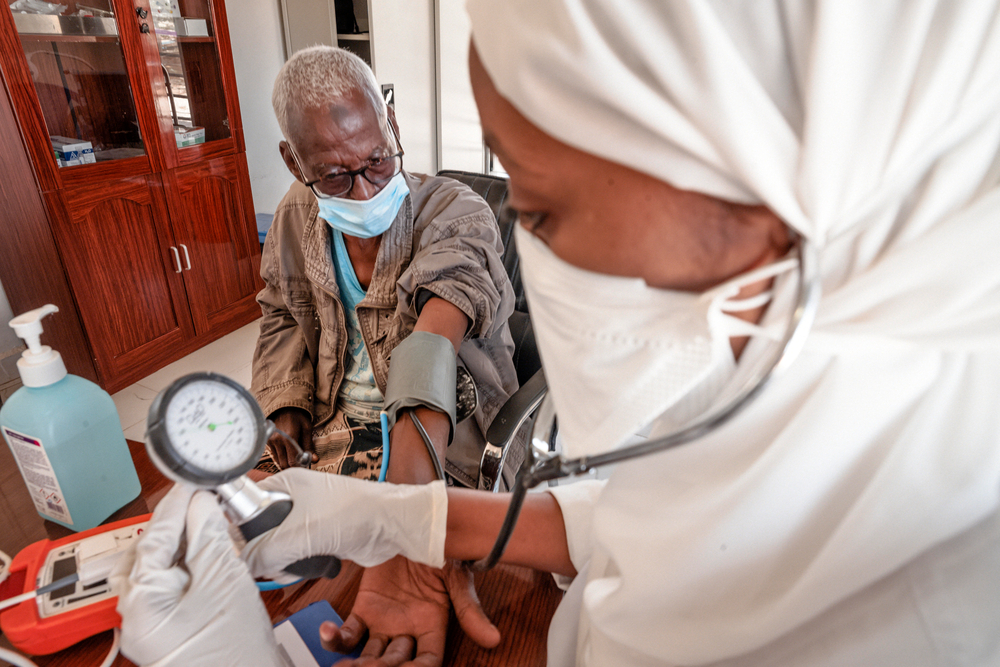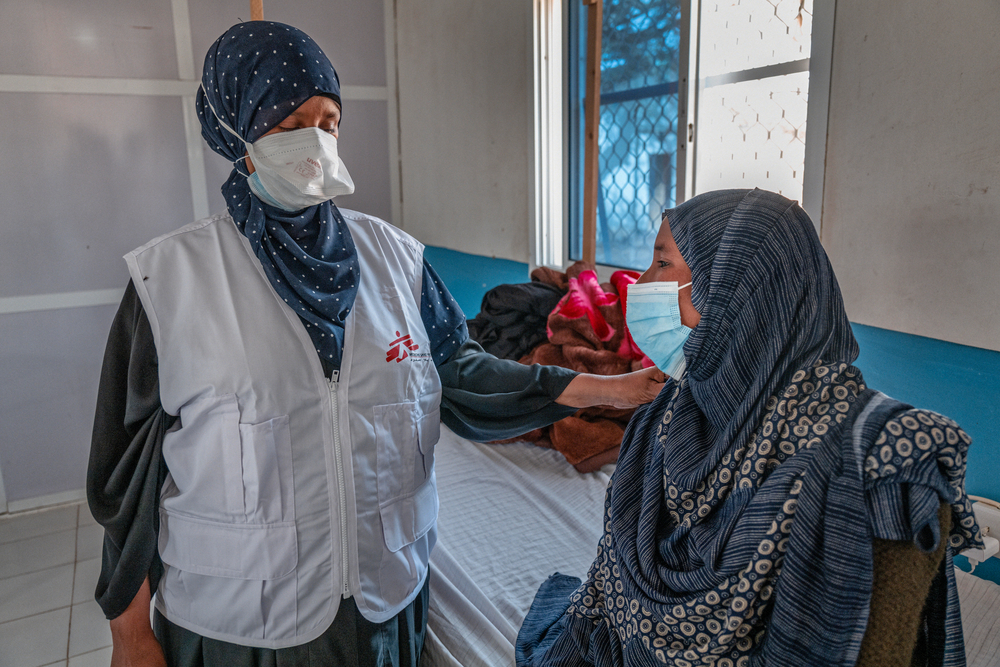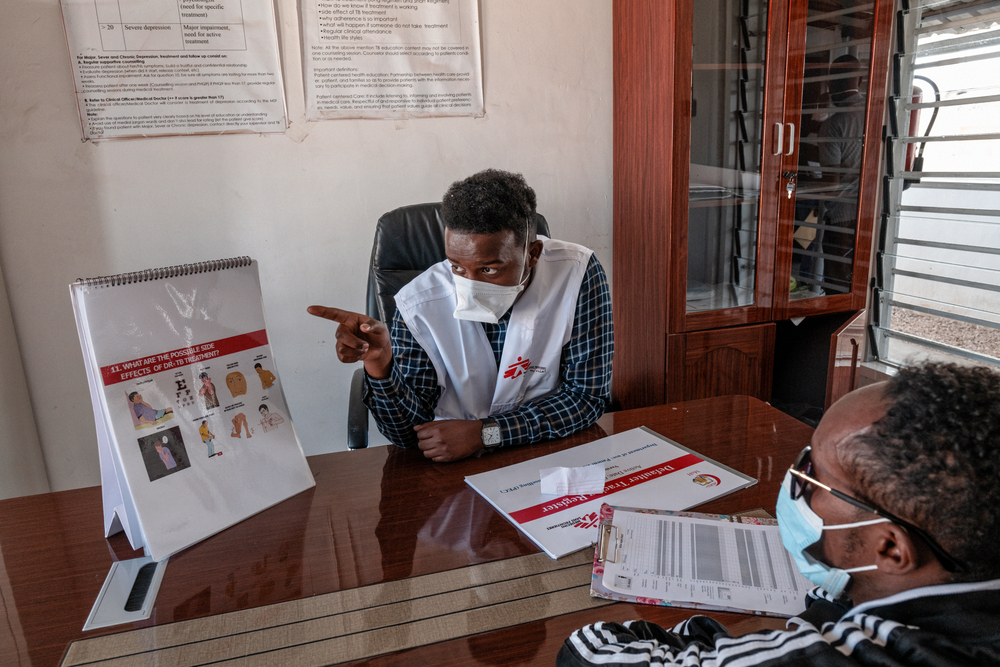Tuberculosis (TB) is a major public health problem in the Horn of Africa, with Somalia one of the most affected countries where TB cases are increasing each year, causing a high death and disease burden. This is attributed to several factors, including limited awareness of the disease, long distances to health facilities that impede access to treatment and recovery, and prevalent use of traditional healers.
Since 2019, MSF has been supporting the drug-resistant TB treatment facilities in the general hospitals of Hargeisa, the capital of Somaliland, and in Berbera, a city three hours away to the northeast. TB cases are referred to these two facilities from across Somaliland and neighboring regions such as Somali region in Ethiopia and South-Central Somalia.
Mohamed Muse, a DR-TB patient in Hargeisa, explains below the hard choice he faced of leaving behind his remaining herds of livestock ravaged by drought and seeking treatment. He was left with the option of trekking through the broiling sun in an unforgiving terrain or facing the fatal consequences.
Treatment of drug-resistant TB can last up to 20 months and patients are required to make daily trips to TB centers to take their medication. It can be extremely difficult for patients to complete the long, toxic DR-TB treatment regimens without consistent encouragement and support, particularly when faced with personal hardships, such as the loss of a family member, unemployment or social exclusion due to fear of the disease. Working with the Ministry of Health (MoH) and the National TB Programme (NTP), MSF is conducting awareness campaigns to reach more people, especially those in remote areas, urban centers and internally displaced sites (IDPs), to encourage testing and treatment for DR-TB.
I was heartbroken when I was diagnosed with TB for the third time. I felt this time, I won’t survive it.

It can be extremely difficult for patients to complete the long, toxic DR-TB treatment regimens, and side effects may include fatigue, nausea, depression and vomiting. [© Sean Sutton]
Mohamed Muse, 36, thought he had triumphed over TB after overcoming the disease two times before. Mohamed sought treatment in the Somali region of Ethiopia, and eventually came to Somaliland in search of healthcare. Not long after a second nine-month TB treatment in Hargeisa, Mohamed fell ill again in early 2020. His chest was hurting and he had a persistent cough and weight loss. This was happening at the same time his family was struggling with drought.
“I had a feeling that the symptoms were like previous TB infections. I was not getting any better. We didn’t have food, and the livestock were dying. A meal a day was hard to come by. I looked for bus fare to go to Hargeisa for treatment. It’s hard to find a TB facility in my rural area or in nearby districts,” said Mohamed.
Mohamed boarded a bus for the four-hour trip to Hargeisa alone and was received by relatives. The following morning, he visited Hargeisa TB Hospital where his sputum and blood were tested for TB. Mohamed was diagnosed with drug-resistant TB.
“I was heartbroken when I was diagnosed with TB for the third time. I felt this time, I will not survive it. I was also shocked when I found out that the treatment usually lasts twenty months. During the first weeks of taking the medication, I was nauseous, vomiting every time I swallowed a pill, and I developed skin rashes. I also experienced depression, thinking about my family and the drought back home. At the TB hospital, I have food, a bed, and monthly stipends so I can buy nutritious food and drinks while I get better,” said Mohamed.
Thirteen months into the treatment, Mohamed had made steady progress and is now back on his feet. He says his main priority after being cured is to get married and start a family.
I was confined to a wheelchair. I gave up on life and accepted the disability. Now I can walk on my own.

Ilhan Mohamed, nurse supervisor, carrying out morning routine visits at the DR-TB ward in Hargeisa TB Hospital, Somaliland [© Sean Sutton ]
Sainab Ali, 35 years old, has drug-resistant tuberculosis (DR-TB) and has spent five months in Hargeisa TB hospital supported by MSF. Sainab fled along with her siblings to Ethiopia when her country, Somalia, plunged into civil war in 1991. With few opportunities in the Sheder refugee camp in Ethiopia’s Somali Region, Sainab moved to Borama, Somaliland to start a vegetable business.
After a month of thinking she had a lingering cold, or possibly the flu that would go away on its own, she went to see a doctor. She was treated for diseases that she did not suffer, such as typhoid and pneumonia, in private health facilities at personal cost. She visited several other health facilities, while her condition deteriorated.
After referral from Borama Hospital, she was brought to the MDR-TB facility in Hargeisa supported by MSF, confined to a wheelchair, unconscious and pale. After five months of treatment, Sainab has regained her strength and can now walk by herself without support.
“I was worried when I discovered that this form of TB treatment would take 20 months because it felt like a very long time. However, I was also relieved that my illness had finally been diagnosed. When I started medication - 14 pills a day - I would vomit every time I swallowed a pill because I was not eating properly, and it was difficult to withstand such strong side effects of the medication. I had given up on life. I had accepted the disability. But now I can walk on my own,” said Sainab.
As a TB survivor, I want to work to raise awareness about TB and help support others recently diagnosed as they go through treatment.

An MSF counsellor supports a patient and explains how TB spreads. The counselling sessions offered to patients, families and in the community aim to raise awareness and to address knowledge gaps and stigma surrounding TB in Somaliland. [© Sean Sutton ]
"My name is Abdirahman Sugule. I live in Berbera. I am 58 years old and used to work in a restaurant as a cook. I was diagnosed with a form of TB that is resistant to drugs, known as DR-TB. It started with a light cough and fever. I bought some antibiotics from the pharmacy, which relieved the pain temporarily. After three weeks, the cough became drier, and I started spitting bloodstained sputum, even sometimes bright red blood. My condition deteriorated and I fell unconscious.
I was brought to Berbera TB Hospital where I was diagnosed with DR-TB. I was admitted to the ward where I started treatment. Since I was very weak and hardly eating anything, taking fourteen pills a day was gruesome. I was provided with proper counseling, free treatment, a bed, and meals. I now know that TB is curable and preventable.
After six months of treatment, I have slowly regained my strength and almost all symptoms have disappeared. As a father of six kids, prayers and my daily connection with God helped me during this difficult time.
Although I have now tested negative and am being discharged, people may still believe I have a remnant of TB in my body and will avoid me. I feel I have a responsibility to dispel some myths about TB in the community. As a TB survivor and with some basic knowledge of TB, I will be working to raise awareness about the disease. I want to help support others that have been recently diagnosed and are going through treatment.
I am hoping to return to work again soon. "
![Declared cured a patient is leaving to go home. Follow-up testing will confirm no relapse [© Sean Sutton] Declared cured a patient is leaving to go home. Follow-up testing will confirm no relapse](/sites/default/files/styles/hero_desktop/public/msfimages/news/msb123804_medium.jpg?itok=DeFzFSsv)